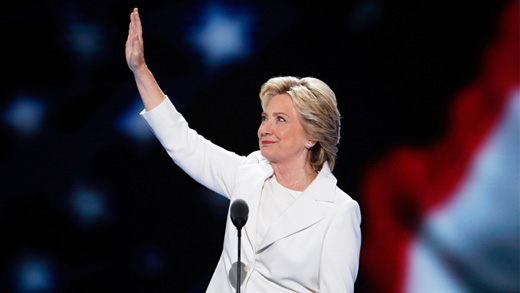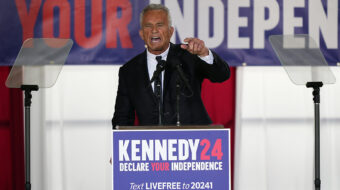
This article is part of a series on the Democratic National Convention.
PHILADELPHIA – Hillary Rodham Clinton walked onto the stage and into the history books at the Democratic National Convention here Thursday night, becoming the first woman to accept a major party’s nomination for President of the United States.
Proclaiming to a 20,000-strong crowd at Philadelphia’s Wells Fargo Center that “America once again faces a moment of reckoning,” Clinton presented a program that contrasted sharply with the fear and division of Donald Trump’s Republican campaign. “Powerful forces are threatening to pull us apart,” she said, referring to Trump. “Bonds of trust and respect are fraying.”
Beating Trump, the former secretary of State said, will require a broad coalition of diverse groups and constituencies. That strategy, with its slogan of “Stronger Together,” is a direct challenge to the one-man authoritarianism that was pitched at the RNC in Cleveland last week. Speaking to the nation, Clinton cautioned against Trump’s false promises, “Don’t believe anyone who says: I alone can fix it.”
Her address acknowledged the historical importance of her candidacy to the struggle for equality, highlighted the breadth of the 2016 Democratic platform, and argued for unified action by all the forces for social progress heading into November and beyond.
Milestone for equality
Ninety-six years have passed since the women’s suffrage movement won the struggle for the ballot. Now, just before the 19th Amendment’s centenary, a woman stands poised to win the highest office in the land.
From Victoria Woodhull, the first female presidential candidate in 1872, to Geraldine Ferraro, the first female to be nominated for vice president by a major party in 1984, there have been many women leaders and activists who prepared the way for Clinton’s ascension to the top of the ticket.
In her speech, Clinton acknowledged the historic nature of her nomination, noting, “We’ve reached a milestone in our nation’s march toward a more perfect union.” She said that nominating a woman for president sets an example not just for women and girls, however, but also plays a role in setting expectations for men and boys. They develop appreciation and respect for women generally when more females take on leadership positions.
Stronger together
With a message of economic growth and broadly-shared prosperity, Clinton signaled an intention to build upon the accomplishments of the Obama Administration. Though she did not mention the Fight for $15 campaign by name, Clinton said that the minimum wage should be a living wage. Countering Trump’s empty promise of reopening shuttered mines and mills, she also spoke specifically to working class Americans who have not seen the benefits of globalization and free trade trickle down to them.
“An awful lot of people feel there is less and less respect for the work they do. And less respect for them, period,” Clinton said. “Democrats,” she argued, “are the party of working people.” She admitted, however, that the party has not “done a good enough job showing that we get what you’re going through, and that we’re going to do something about it.”
Clinton addressed the need for reforming the role of big money in politics, saying that as president she would act to overturn Citizens United, via constitutional amendment if necessary. She also argued for a rebalancing of power in the economy, declaring, “Wall Street, corporations, and the super rich are going to start paying their fair share of taxes.”
The Democratic nominee reached out to the supporters of Senator Bernie Sanders, some of whom have expressed reluctanance about supporting her in the general election. She thanked Sanders for putting “economic and social justice issues front and center, where they belong.”
Addressing his delegates in the hall, Clinton said, “Your cause is our cause. Our country needs your ideas, energy, and passion. That’s the only way we can turn our progressive platform into real change for America.”
Calling for unity around the Democratic platform, widely seen as among the party’s most progressive ever, she said, “We wrote it together – now let’s go out there and make it happen together.”
She also recognized the central issues of the Black Lives Matter movement and pledged to lead the charge on reforming the criminal justice system. She asked Americans to put themselves in the shoes of young black and Latino men and women “who face the effects of systemic racism, and are made to feel like their lives are disposable.”
Hitting back against the anti-immigrant and anti-refugee planks of the Trump-GOP program, Clinton said that rather than building a border wall, the task was to instead “build an economy where everyone who wants a good-paying job can get one.” She vowed to pursue comprehensive immigration reform and help open pathways to citizenship for undocumented people.
Trump’s Islamophobia was roundly rejected in both Clinton’s speech and in remarks earlier in the evening by the parents of Captain Humayun Khan, a young Muslim American man killed in the line of duty while serving in the U.S. Army in Iraq in 2004. “We will not ban a religion,” Clinton declared.
She also indicted the recklessness and unpredictability which has characterized the Trump campaign as evidence that he could not be trusted with foreign policy issues. “Imagine him in the Oval Office facing a real crisis,” she said. “A man you can bait with a tweet is not a man we can trust with nuclear weapons.”
And in a forceful rebuke to Trump’s accusations that she is trying to “play the woman card” of identity politics in the election, Clinton told the nation, “We’re going to help you balance family and work… If fighting for affordable child care and paid family leave is playing the “woman card,” then Deal Me In!”
Clinton’s solid embrace of her feminist credentials electrified the hall, bringing delegates to their feet. The impact of her speech in the arena was palpable, especially among women. Her nomination represented the achievement of a goal many have waited decades to see.
From the White House to the statehouses
Clinton made the case for the broadest possible coalition to secure a landslide victory against Trump. Securing any of the progressive components in the party platform will require not only keeping the White House out of Trump’s hands, but also taking back the Senate, putting a dent in GOP rule in the House, and making gains in legislative and gubernatorial races across the nation.
With direct appeals to workers, women, African-Americans, Latinos, the LGBT community, and people with disabilities, coalition politics saturated Clinton’s speech. Disaffected Republicans unwilling to be complicit with Trump’s extremist agenda were also welcomed to join with these popular movements on Election Day.
The optimistic vision of the Clinton campaign, along with its multicultural, multiracial makeup presented a forward-looking embrace of the future. In Cleveland, by contrast, Trump was trying to sell a dystopian, pessimistic, and exclusionary outlook meant only to sow fear.
The two roads presented by these campaigns have placed a clear choice before American voters.
Photo: WordPress












Comments